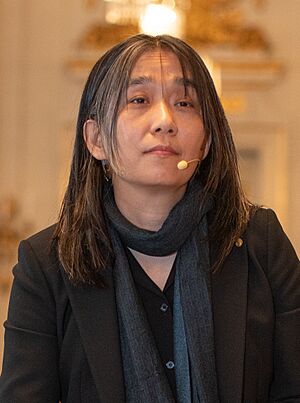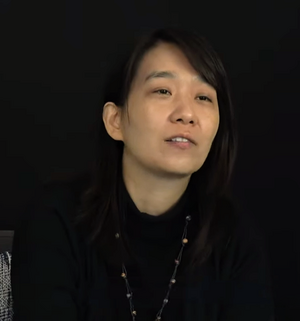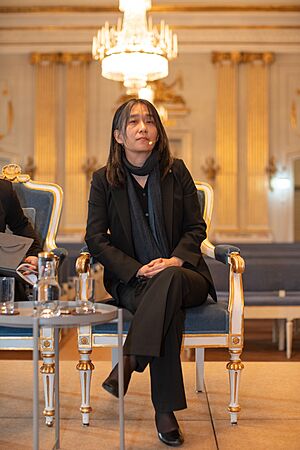Han Kang facts for kids
Quick facts for kids
Han Kang
|
|
|---|---|

Han in 2024 during Nobel Week
|
|
| Born | November 27, 1970 Gwangju, South Korea |
| Pen name | Han Kang-hyun |
| Occupation | Writer |
| Alma mater | Yonsei University |
| Genre | Fiction |
| Notable works | The Vegetarian Human Acts |
| Notable awards | Yi Sang Literary Award 2005 International Booker Prize 2016 Prix Médicis étranger 2023 Nobel Prize in Literature 2024 |
| Spouse |
Hong Yong-hee
(divorced) |
| Children | 1 |
| Parents | Han Seung-won (father) |
| Signature | |
 |
|
| Korean name | |
| Hangul |
한강
|
| Hanja |
韓江
|
| RR | Han Gang |
| MR | Han Kang |
Han Kang (Korean: 한강; born November 27, 1970) is a famous writer from South Korea. She used to teach creative writing at the Seoul Institute of the Arts. Han Kang became well-known around the world for her novel The Vegetarian. This book was the first Korean novel to win a big award called the International Booker Prize in 2016.
In 2024, Han Kang made history. She became the first Asian woman and the first Korean writer to win the Nobel Prize in Literature. She received the award for her "intense poetic prose that confronts historical traumas and exposes the fragility of human life." This means her writing is very powerful and deals with difficult past events, showing how delicate human life can be.
Contents
Early Life and Education
Han Kang was born in Gwangju, South Korea, on November 27, 1970. Her father, a novelist named Han Seung-won, named her after the Han River (Lua error in Module:Korean at line 109: attempt to call field '_xlit' (a nil value).). Her family is very artistic. Her older brother, Han Dong-rim, is also a novelist. Her younger brother, Han Kang-in, writes novels and draws cartoons.
When Han Kang was nine, her family moved to Suyu-ri in Seoul. This happened because her father decided to become a full-time writer. Four months later, the Gwangju Uprising took place. This was a movement where people wanted more democracy, but it ended sadly with soldiers hurting students and regular people.
Han Kang learned about this event when she was 12. She found a secret photo album at home. It had pictures taken by a German journalist, Jürgen Hinzpeter. Seeing these photos deeply changed how she saw people and influenced her writing.
Her father sometimes found it hard to earn enough money as a writer. Han Kang later said her childhood was "too much for a little child." But being surrounded by books always made her feel better. She finished Poongmoon Girls' High School in 1988. In 1993, she graduated from Yonsei University, where she studied Korean language and literature.
Writing Career
After college, Han Kang worked briefly as a reporter for a magazine called Saemteo. Her writing career officially began in 1993. Five of her poems, including "Winter in Seoul," were published in a literary magazine. The next year, she started writing fiction. Her short story "The Scarlet Anchor" won a New Year's Literary Contest.
Her first collection of short stories, A Love of Yeosu, came out in 1995. People noticed it because of its clear and well-structured stories. After this book, she left her magazine job to focus only on writing.
In 2007, Han Kang released a book called A Song to Sing Calmly (가만가만 부르는 노래). It came with a music album. At first, she didn't plan to sing, but a music director convinced her to record the songs herself. In the same year, she started teaching writing at the Seoul Institute of the Arts. She taught there until 2018.
The Vegetarian and Other Novels
In college, Han Kang was very interested in a line from a Korean poet named Yi Sang: "I believe that humans should be plants." She thought this line meant protecting oneself from the violence of Korea's past under Japanese rule. This idea inspired her to write her most famous book, The Vegetarian.
The second part of this three-part novel, called Mongolian Mark, won the Yi Sang Literary Award. The Vegetarian was the first of Han Kang's novels to be translated into English. The English translation, done by Deborah Smith, won the International Booker Prize in 2016. This was a huge achievement. Han Kang was the first Korean writer to be nominated for this award. The Vegetarian was also named one of "The 10 Best Books of 2016" by The New York Times Book Review.
Han Kang's novel Human Acts was published in English in 2016. This book also received awards, like the Premio Malaparte in Italy. It was also considered for the International Dublin Literary Award in 2018.
Her third novel, The White Book, was also shortlisted for the International Booker Prize in 2018. This book is about her own life. It talks about the sadness of losing her older sister, who was a baby and died just two hours after being born.
In 2021, Han Kang's novel We Do Not Part was released. It tells the story of a writer who is looking into the Jeju uprising from 1948–49. This uprising had a big impact on her friend's family. The French version of this novel won the Prix Médicis Étranger in 2023.
In 2023, her novel Greek Lessons was translated into English. The Atlantic magazine said it was a book where "words are both insufficient and too powerful to tame." In 2024, her short story "Heavy Snow" was published in The New Yorker magazine.
Personal Life
Han Kang was married to Hong Yong-hee, who is a literary critic and professor. She shared in 2024 that they had been divorced for many years. Han Kang has a son. They used to run a bookstore together in Seoul from 2018 until November 2024.
Han Kang has mentioned that she sometimes gets migraines. She believes these headaches help her stay humble.
Awards and Recognition
Han Kang has won many awards for her writing.
- She won the Yi Sang Literary Award in 2005 for Mongolian Mark.
- In 1999, she received the Korean Novel Award for her novella Baby Buddha.
- The Korean Ministry of Culture gave her the Today's Young Artist Award in 2000.
- She also won the Dongri Literary Award in 2010 for The Wind is Blowing.
In 2018, Han Kang was chosen to be part of the Future Library project. This project involves writers creating a manuscript that will be kept secret and not published until 2114. The project's organizer, Katie Paterson, said Han Kang was chosen because she "expands our view of the world." Han Kang gave her manuscript, Dear Son, My Beloved, in May 2019. She explained that wrapping her manuscript in a white cloth was a reference to Korean culture. White cloth is used for babies and for mourning. She called the event "like a wedding of my manuscript with this forest. Or a lullaby for a century-long sleep."
In 2023, Han Kang became an International Writer for the Royal Society of Literature. This award recognizes her important contributions to literature around the world. In July 2024, The Vegetarian was ranked 49th in The New York Times's "100 Best Books of the 21st century."
Nobel Prize in Literature
In 2024, Han Kang received the Nobel Prize in Literature from the Swedish Academy. She was honored for her "intense poetic prose that confronts historical traumas and exposes the fragility of human life." This made her the first Korean writer and the first female Asian writer to win this very important award.
People in South Korea celebrated her win a lot. Han Kang herself said she was surprised but very honored. She gave her Nobel lecture, titled Light and Thread, on December 7, 2024, in Stockholm.
List of Awards
- 1999 – Korean Novel Award for Baby Buddha
- 2000 – Korean Ministry of Culture Today's Young Artist Award – Literature Section
- 2005 – Yi Sang Literary Award for Mongolian Mark
- 2010 – Dongri Literary Award for The Wind is Blowing
- 2014 – Manhae Literary Award for Human Acts
- 2015 – Hwang Sun-won Literary Award for While One Snowflake Melts
- 2016 – Yonsei Award for Excellence in Liberal Arts
- 2016 – International Booker Prize for The Vegetarian
- 2017 – Malaparte Prize for Human Acts
- 2018 – Kim Yu-jeong Literary Award for Farewell
- 2018 – San Clemente Literary Prize for The Vegetarian
- 2019 – Inchon Award Media & Culture Section
- 2019 – Future Library project Writer of the Year
- 2022 – Daesan Literary Award for We Do Not Part
- 2022 – Kim Man-jung Literary Award for We Do Not Part
- 2023 – Prix Médicis étranger for We Do Not Part
- 2024 – Émile Guimet Prize for Asian Literature for We Do Not Part
- 2024 – Ho-Am Prize in the Arts
- 2024 – Nobel Prize in Literature
- 2024 – Pony Chung Innovation Award
Book to Film Adaptations
Two of Han Kang's books, Baby Buddha and The Vegetarian, have been made into movies.
Lim Woo-Seong wrote and directed the film Vegetarian, which came out in 2009. This movie was chosen as one of only 14 films (out of 1,022 submitted) for a special competition at the North American Film Fest. It was also noticed at the Busan International Film Festival.
Lim also worked with Han Kang to turn Baby Buddha into a movie script. He directed the film version, which was called Scars and released in 2011.
See also
 In Spanish: Han Kang para niños
In Spanish: Han Kang para niños
- Korean literature
- List of Korean novelists
- List of Korean-language poets
- List of Korean women writers
- List of Nobel laureates in Literature
 | Tommie Smith |
 | Simone Manuel |
 | Shani Davis |
 | Simone Biles |
 | Alice Coachman |



